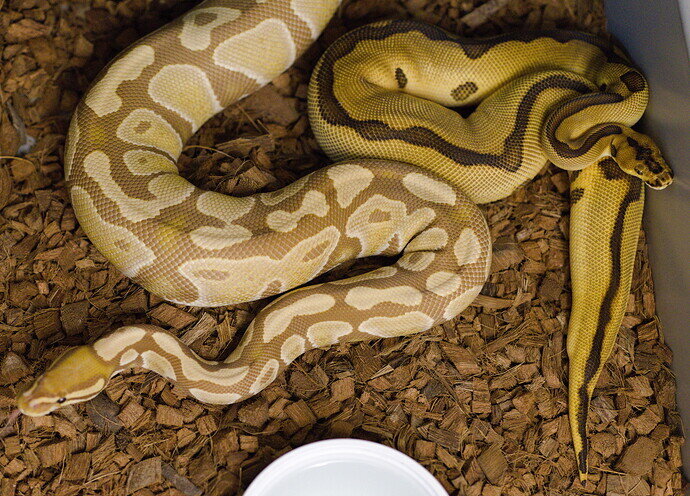I’ve been doing this and had amazing  results too. Smaller meals more frequently works well for me . What a cracking read
results too. Smaller meals more frequently works well for me . What a cracking read 
Would you mind sharing your results? If I was to get into balls as a side project, I would want some sound evidence, so that I could use this method.
Does anyone have stats on lifespan of animals fed more frequently as hatchlings? Opponents of this practice claim these animals suffer and die faster than animals fed every 1-4 weeks.
I did a bit of an experiment trying this method on a new male I got in 5 months ago as a newborn (leopard enchi clown). I didn’t necessarily feed daily but made a point to feed significantly more frequently using much smaller meals. More like 3-5 times per week.
In less than 5 months he grew to 650+ grams. Out of curiosity I put him in with a virgin female (ultramel) a couple weeks ago and to my surprise he locked up with her very quickly despite being so young.
It seems smaller more frequent meals will definitely grow them faster and potentially allow them to breed much sooner. The question still remains, is it detrimental to their long term health? I’m skeptical since there seems to be indication in the wild they feed more frequently at a young age. If I have any issues I’ll report back. He’s on a standard once per week feeding schedule currently and rock solid!
After reading a lot of this and thinking about all the possibilities it almost seems like baby snakes could be like baby humans in the way that more frequent meals are beneficial at a younger age but as you get older your meal requirements spread out to longer apart and fewer. But kinda seems like in the wild they would be wanting to grow as quick as they can to gain size and survive to defend from predators so what would be any different in their thinking being captive if they might not necessarily have a different mindset than a wild snake
^ read up,
That’s the wilbanks way 
“After reading a lot of this and thinking about all the possibilities it almost seems like baby snakes could be like baby humans in the way that more frequent meals are beneficial at a younger age but as you get older your meal requirements spread out to longer apart and fewer. But kinda seems like in the wild they would be wanting to grow as quick as they can to gain size and survive to defend from predators so what would be any different in their thinking being captive if they might not necessarily have a different mindset than a wild snake”
I’ve been trying to tell people this for 30 years. Bravo for thinking like a snake!
I also read somewhere that young ball pythons collected from the wild were nearly always bigger than the expected size in captivity. I think that this is exactly what happens in the wild.
I decided to follow the smaller more frequent meals for the first year with my snakes. Not so much because I want them to grow faster so I can breed faster. I intend to wait at least until the females are three years old anyway. But, because it makes sense to me that it more accurately mimics their natural eating habits. There is a distinct advantage to getting out of the juvenile stage as soon as possible for most prey animals.
Makes sense. Eat what they can when they can and grow faster to outgrow predators
